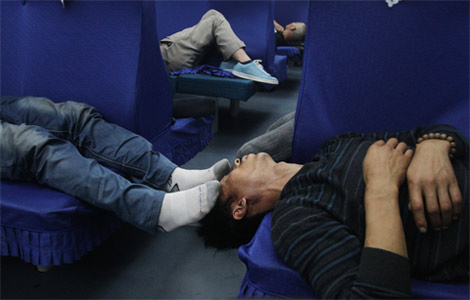Big rise in Chinese overseas
Updated: 2014-01-22 23:11
By YANG WANLI (China Daily)
|
||||||||
The general trend is set to continue, as many developed countries are facing labor shortages. The US is poised to triple the number of visas granted to technology specialists to 500,000 by 2018. Demand will also rise for those with basic skills, such as plumbers.
The center's report said that more than half of employers in Australia and New Zealand had difficulty in recruiting in 2012, while in Japan more than 80 percent of bosses said they had been unable to fill a shortfall in skilled labor.
 |
|
Several African people buy fruit at a market in Guangzhou. Many African migrants live and work in the southern city. Liu Dawei / Xinhua |
Liu Guofu, a professor from the Law School at the Beijing Institute of Technology, said: "Compared with its total population, China's emigration figures are not that high.
"Rather than saying that we are losing talent, I'd prefer to believe that those Chinese who go overseas will contribute to the development of China by returning with much-needed skills."
The center released statistics last year showing that the number of Chinese returning home, especially those with good educational backgrounds, has been increasing since 2004 and will surpass the number of those leaving the country within the next five years.
Permanent residency was granted to 148,000 Chinese citizens in foreign countries in 2012. In China, 1,202 foreigners received permanent residency status in that year.
Given that China has close to 1.4 billion people, those holding green cards represent a tiny percentage. The comparable figure in the US is about 5 percent.
Qi Lixin, chairman of the Beijing Entry and Exit Service Association, said: "The big gap between the two indicates that China should be more open to the world. The immigration law in China is not that friendly to foreigners."
Under the law, at least four kinds of green card are available in China: For those who have invested at least $500,000 in the country; technical personnel, such as deputy managers and associate professors; people with special skills, or those "needed by the State"; and for spouses, provided they have been married for five years or more and have lived in China for at least nine months each year.
For foreign students in China, obtaining a Chinese work visa directly after graduating is quite complicated.
Yamagjchi Akio, a Japanese student studying international trade at the University of International Business and Economics in Beijing, said he hopes he can stay in China after graduation.
"I like China and I believe that if I stay here there will be more opportunities for my future career than in Japan," he said in fluent Chinese.
Foreign students in China have to return home to change a study visa into a work visa, involving a significant amount of time and paperwork.
Zhao Xinying and Matt Hodges in Shanghai contributed to this story.

 US anti-abortion rallies march for life
US anti-abortion rallies march for life
 PLA navy drills in South China Sea
PLA navy drills in South China Sea
 Catnaps help travelers keep going
Catnaps help travelers keep going
 Japan seeks US understanding about dolphin hunt
Japan seeks US understanding about dolphin hunt
 Snow storm hits US East Coast
Snow storm hits US East Coast
 China begins receiving oil from Russia
China begins receiving oil from Russia
 Underwater photos exhibited in Beijing
Underwater photos exhibited in Beijing
 Obama honors Dr King with volunteer work
Obama honors Dr King with volunteer work
Most Viewed
Editor's Picks

|

|

|

|

|

|
Today's Top News
China seeks to attract skilled foreign workers
State Council discusses draft government work report
China dismisses Abe's call for talks
Xi sends festive greetings to non-communist members
Lawsuit blames plane’s warning systems for crash
Argentine president ends long public silence
Report shows big rise in Chinese overseas
Export adds to air blight
US Weekly

|

|







